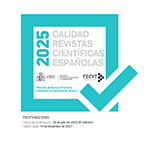'El Hormiguero' gana el premio Rose d’Or al Mejor Programa de Entretenimiento (6 de mayo 2009). 20minutos. Recuperado de: https://www.20minutos.es/noticia/466860/0/hormiguero/premio/rose/ 'El Plan B' de 'El Hormiguero' gana una Rose d'Or (11 de mayo de 20
Abstract
In the last fifteen years the Spanish audiovisual sector has undergone transformations (the analog blackout and the end of advertising on RTVE (2010), the birth of new generalist channels such as Cuatro (2005) and La Sexta (2006) or the arrival of new broadcasting agents such as Netflix (2105) that marked its development. The aim of this paper is to know if there has been evolution in the Spanish television preferences during the 2005-2019 period. The conclusions indicate that there is a wear of some formats such as series, some historical television programs in Spain are successfully maintained and some formats are incorporated as a result of the hybridization of genres. It is also found that there is an evident increase in the success of content connected with the present, anchored to the current moment and whose time shifted consumption diminishes their value
Downloads
Article download
License
In order to support the global exchange of knowledge, the journal Estudios sobre el Mensaje Periodístico is allowing unrestricted access to its content as from its publication in this electronic edition, and as such it is an open-access journal. The originals published in this journal are the property of the Complutense University of Madrid and any reproduction thereof in full or in part must cite the source. All content is distributed under a Creative Commons Attribution 4.0 use and distribution licence (CC BY 4.0). This circumstance must be expressly stated in these terms where necessary. You can view the summary and the complete legal text of the licence.










